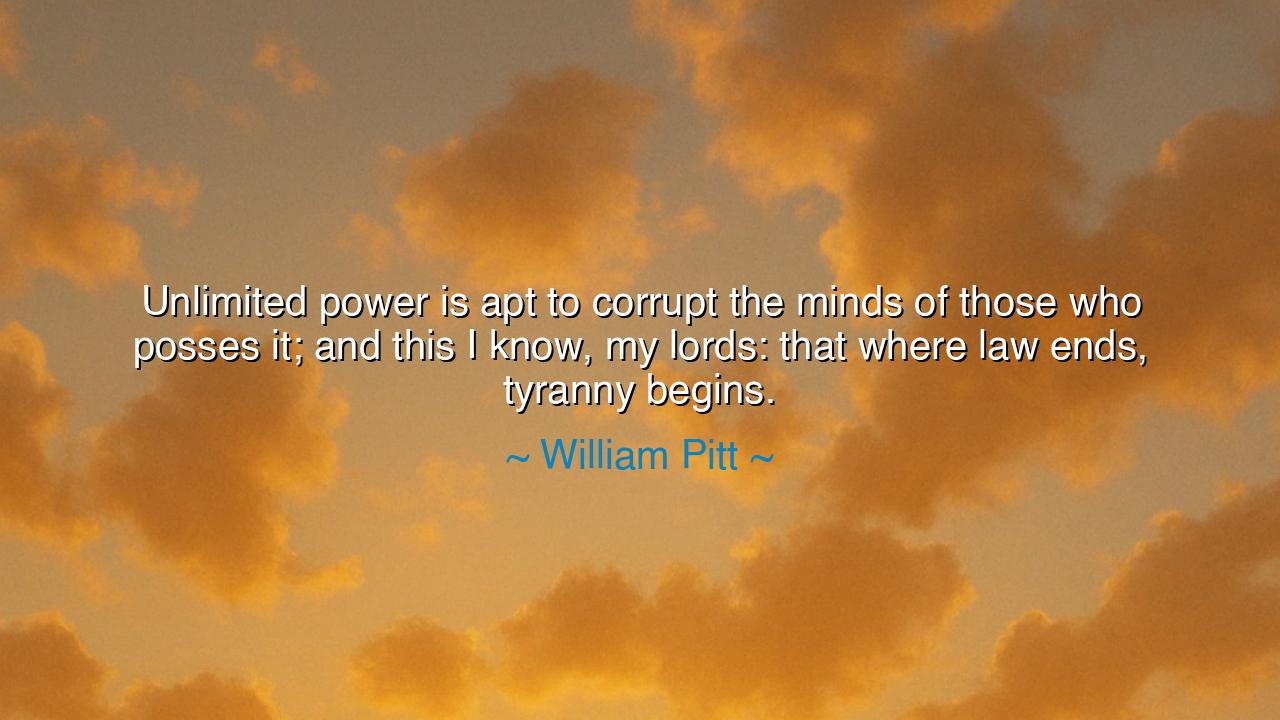
Unlimited power is apt to corrupt the minds of those who posses
Unlimited power is apt to corrupt the minds of those who posses it; and this I know, my lords: that where law ends, tyranny begins.






The great orator and defender of liberty, William Pitt, stood before the lords of England and declared: “Unlimited power is apt to corrupt the minds of those who possess it; and this I know, my lords: that where law ends, tyranny begins.” In this pronouncement he forged a warning for all ages: that unchecked power, though it may begin in noble hands, soon twists the heart and darkens the mind. Without the restraint of law, rulers forget justice, and in its place arises the shadow of tyranny.
The origin of this wisdom lies in Pitt’s struggle to preserve liberty during a time of political upheaval in Britain. As Prime Minister and parliamentarian, he knew that kings and ministers alike were tempted to stretch their reach beyond the limits of justice. He saw with piercing clarity that law is the boundary that keeps freedom alive; without it, men are reduced to subjects of another’s will. His words echo the eternal struggle between order and domination, between government by reason and rule by fear.
History confirms Pitt’s truth in the tale of Julius Caesar, who began as a servant of the republic but, wielding nearly unlimited power, crossed the Rubicon and bent Rome to his will. The republic crumbled, and in its place rose the empire—glorious in appearance, but built on the ruins of liberty. Where once the Senate ruled by law, now a single man ruled by decree. The story of Rome became a testament: when law is broken, tyranny is born.
The ancients themselves feared this corruption. The Greeks warned against the rise of the tyrant, who first comes as a protector of the people but ends as their oppressor. Even the Hebrews cried out when their kings forgot the law of God, ruling with power but not with justice. Time and again, the wisdom of the ages affirms Pitt’s declaration: without limits, power devours the soul and destroys the commonwealth.
Therefore, O seekers of freedom, hold fast to the rule of law. Do not be deceived by the promises of men who claim that their own strength will bring safety, for safety without law is only slavery in disguise. Remember always: unlimited power corrupts not only the tyrant, but the people who kneel to him. Guard your liberty with vigilance, and let justice be bound by laws that none may break. For where law ends, tyranny begins—and where law endures, freedom lives forever.






NKNgan Kim
This makes me reflect on personal and organizational power as well. Can unlimited control in business, education, or other domains corrupt even well-intentioned individuals? How can systems be designed to distribute power responsibly and encourage ethical behavior? I’d like to explore lessons from history and psychology on how both structures and personal ethics can prevent the slide from authority to tyranny.
HTNguyen Hong Tri
I find this quote relevant to contemporary politics. Are there examples today where leaders or institutions have exceeded their legal authority, leading to authoritarian outcomes? How can citizens and watchdog organizations detect and resist the gradual erosion of legal constraints before tyranny takes hold? I’d like a perspective on practical strategies for maintaining the balance between authority and accountability.
BTBao tran
I’m intrigued by the connection between law and freedom. If tyranny begins where law ends, does that mean legal frameworks are the primary safeguard against oppression? How do informal norms, civic engagement, or ethical leadership complement formal legal boundaries in preventing abuse of power? I’d like to explore whether law alone is sufficient, or if societal vigilance is equally crucial.
DSddd sss
This raises philosophical questions about human nature. Are we naturally prone to misuse power when given freedom, or can moral education and culture cultivate restraint? How does the temptation of absolute power interact with personal ambition and societal pressures? I’m curious whether some systems or philosophies have successfully minimized the risk of tyranny while empowering effective leadership.
DNVo Duy Nhat
I feel concerned about the implications for leadership and governance. If power tends to corrupt, what mechanisms are most effective in preventing this? Are term limits, checks and balances, or transparency enough, or do they merely reduce the scale of potential abuse? I’d love perspectives on how societies can cultivate ethical leaders who wield authority responsibly without succumbing to the allure of unlimited control.